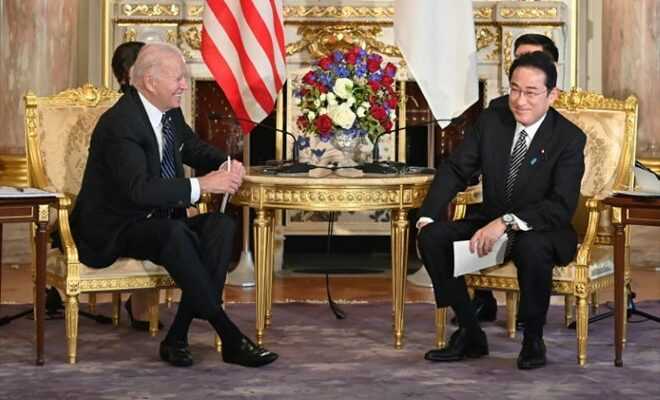US President Joe Biden and Japanese Prime Minister Fumio Kishida, in Tokyo on May 23, 2022 (POOL/AFP/David MAREUIL)
US President Joe Biden met with Japanese Prime Minister Fumio Kishida in Tokyo on Monday and was due to unveil a multilateral trade initiative later this afternoon as part of his effort to reinvigorate US strategic power in the Asia-Pacific. .
After a three-day visit to South Korea, another key Washington ally, Mr. Biden also spoke with Japanese Emperor Naruhito at the Imperial Palace.
U.S. officials portray Japan and South Korea as the linchpins of the U.S. posture against China’s rise, and as partners in a Western-led alliance to isolate Russia after its invasion of China. ‘Ukraine.
“Japan is a key global power” and “the alliance between the United States and Japan has long been the cornerstone of peace and prosperity in the Indo-Pacific,” Biden said after his meeting with Mr. Kishida.
“We will face present and future challenges together,” he added.
“Your visit to Japan is an illustration that whatever the situation, the United States will continue to strengthen its commitment in the region,” said the Japanese Prime Minister.
Also in Tokyo on Tuesday, Biden will seek to bolster American leadership in the Asia-Pacific region by joining leaders from Australia, India and Japan for a summit of an informal alliance called Quad.
This is a “critical opportunity to exchange views and continue to foster practical cooperation in the Indo-Pacific region”, the White House said, using the term used by the US administration to designate the Asia-Pacific region.
However, Quad member India has so far stood out for its refusal to openly condemn Moscow over the war in Ukraine or to curtail its trade with Russia. Mr Biden will have a one-on-one meeting on Tuesday with Prime Minister Narendra Modi.
– Pyongyang ignores Biden –
The fear that the unpredictable North Korea will fire another missile or conduct a nuclear test looms over every stop on Mr Biden’s tour. Nothing happened during his stay in Seoul.
US National Security Advisor Jake Sullivan said the threat was still present and Pyongyang had a choice. “If North Korea acts, we will be prepared to respond. If North Korea does not act, it has the opportunity, as we have already said, to come back to the table” of negotiations, a- he told reporters.
Pyongyang has so far refused to heed calls for dialogue, US officials say, even ignoring offers of help to combat a sudden outbreak of Covid-19.
The situation in North Korea was to be on the agenda for the Biden-Kishida talks, the White House said, along with their “shared vision of a free and open Indo-Pacific,” terminology that takes aim at the growing ambitions of the Chinese diet.
The pair were also due to make a statement on the need for “stability” in the Taiwan Strait amid growing concerns about Chinese pressure on the island.
Mr. Kishida could announce an increase in Japanese defense spending, a sensitive issue in a country whose Constitution proclaims pacifism.
– Commercial initiative –
After a joint press conference with Mr. Kishida, Mr. Biden is due to unveil a long-awaited trade initiative, also intended to consolidate the presence of the United States in the region, dubbed the “Indo-Pacific Economic Framework” (IPEF).
The IPEF is presented by Washington as a framework for what should become a close-knit group of trading nations.
Unlike traditional trading blocs, IPEF members are not expected to negotiate tariffs and facilitate market access, practices that have become unpopular with the American public who fear threats to local production.
The program plans to onboard business partners with agreed standards in four main areas: digital economy, supply chains, clean energy infrastructure and anti-corruption measures.
So far, the White House has remained silent on the number of potential future signatory countries and is still wondering how the standards will be able to be applied.
However, the United States has no political interest in returning to a binding Asian trade deal after Donald Trump withdrew in 2017 from the Trans-Pacific Partnership, which brings together countries from Asia-Pacific and the Americas.
© 2022 AFP
Did you like this article ? Share it with your friends with the buttons below.




